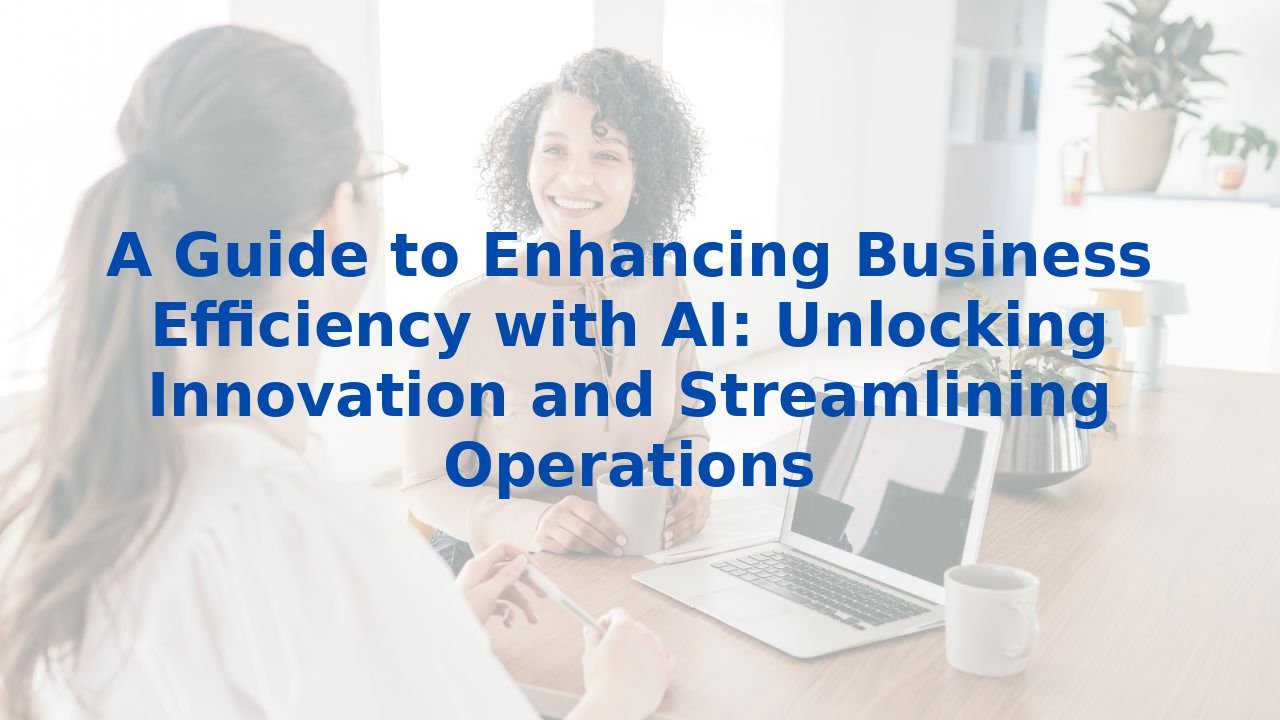A Guide to Enhancing Business Efficiency with AI: Unlocking Innovation and Streamlining Operations

A Guide to Enhancing Business Efficiency with AI: Unlocking Innovation and Streamlining Operations
In an era where adaptability is not just an option but a necessity, organizations are on a relentless quest for improved efficiency and innovation. The driving force behind this evolution is Artificial Intelligence (AI), a transformative tool that helps redefine business processes and operational frameworks. This article explores how AI can enhance various aspects of business operations, streamlining tasks and fostering a culture of growth and improvement.
1. Improving Meetings and Communication
The foundation of effective teamwork lies in efficient communication. AI can lighten the administrative load surrounding meetings by automating repetitive tasks. Imagine AI tools scheduling appointments, transcribing discussions, and summarizing key takeaways—all while you focus on strategic conversations. With AI handling the mundane, your team can channel their energy into what truly matters: collaboration and innovation.
2. Enhancing Sales and Marketing
AI analytics play a crucial role in refining sales strategies and marketing campaigns. By providing predictive insights into customer behavior, AI enables sales teams to target high-value leads more effectively. The integration of chatbots can further enhance customer engagement, offering instant responses and resolving common inquiries to ensure no revenue opportunity slips through the cracks. AI doesn't just assist; it empowers organizations to connect meaningfully with their audience.
3. Assessing and Improving Customer Service
Delivering exceptional customer service is paramount in today's competitive landscape. AI can take the reins in assessing service quality, eliminating the arduous need for manual evaluations. Advanced AI solutions precisely pinpoint problematic interactions, ensuring that teams can uphold customer service standards consistently. Additionally, through automated analysis of customer feedback, businesses can identify areas for ongoing improvement, fostering a customer-centric approach that enhances loyalty and satisfaction.
4. Improving Product Development Processes
The product development phase can often be fraught with time and resource constraints. Enter AI-driven generative design software, a game-changer that accelerates this process. By inputting design parameters, businesses can leverage AI to explore numerous variations swiftly, minimizing the costs associated with less promising prototypes. This newfound speed allows teams to innovate rather than iterate.
5. Automating Content Generation
In a digital world that craves content, AI's capability to generate vast quantities quickly is a blessing. Organizations can utilize AI to create persuasive product descriptions, insightful articles, and more—all in a fraction of the time it would traditionally take. By automating content creation, businesses can keep their audience engaged while focusing on deeper storytelling and connection.
6. Optimizing HR Processes
Human Resources is undergoing a transformative shift thanks to AI. Recruitment automation tools enable organizations to screen candidates and conduct initial assessments efficiently, ensuring that only the most suitable candidates move forward. This not only saves countless hours but also refines the overall quality of hires. Streamlining these processes allows HR professionals to invest their time in strategic initiatives and employee engagement.
7. Enhancing Operational Efficiency
AI offers immense potential in optimizing business operations. By utilizing machine learning algorithms, organizations can automate routine tasks, improve decision-making, and derive actionable insights from advanced analytics. Take, for example, document processing: AI can effortlessly extract key information, reducing manual data entry and the errors that often accompany it. In this way, AI turns operational efficiency into a well-oiled machine.
8. Supporting Better Decision-Making
At its core, AI is about making data-driven decisions smarter and faster. By analyzing large datasets and identifying patterns, AI equips organizations with predictive insights that guide strategic initiatives. Swiftly addressing anomalies—such as unexpected increases in product demand—means businesses can react promptly, alleviating the risk of missed opportunities.
9. Improving Customer Experience
Perhaps the most profound impact of AI is on customer experience. From intuitive chatbots that handle inquiries around the clock to deep analysis of customer feedback for ongoing improvement, AI acts as a force multiplier in building customer relationships. By monitoring and anticipating customer needs, organizations can cultivate a seamless and personalized experience.
10. End-to-End Process Improvement
Finally, the notion of continuous improvement is essential in the rapidly changing business landscape. AI facilitates this through the ongoing monitoring of processes and the application of historical data to proactively alert management of potential issues. This creates a cycle of iterative improvement, where strategies evolve in tandem with business objectives and market realities.
The Benefits of Training Employees for AI
While AI undeniably transforms operations, its full potential is unlocked when employees are equipped with the necessary skills to leverage these technologies. Training is not just beneficial; it's essential. Through AI training, employees can learn to:
- Interpret AI-driven insights: Understanding data recommendations ensures informed and strategic decision-making.
- Operate AI tools effectively: Mastering AI tools minimizes errors and maximizes efficiency, enabling employees to tackle high-value tasks.
- Identify opportunities for improvement: Knowledge of AI empowers employees to recognize areas where automation and optimization can yield meaningful enhancements.
Conclusion
Artificial Intelligence is not merely an upgrade; it's a revolution in how we approach business processes. By enhancing efficiency, refining decision-making, and optimizing operations across various functions, AI acts as a catalyst for creating a culture of innovation. Organizations investing in both AI technologies and comprehensive employee training stand to reap significant rewards, achieving greater productivity and sustainable competitive advantages in the marketplace. In this ever-evolving landscape, the integration of AI into core business operations is imperative for thriving in the future.